
Best Countries to Hire Offshore Developers
AUTHOR
Talent JDI
READ TIMES
1 minutes
LAST UPDATED
Jan 30, 2026
A bigger talent pool, lower costs, and access to skilled developers are the usual reasons companies look to hire offshore developers.
However, these advantages depend largely on the country you choose. While many locations offer benefits, only a few truly stand out in terms of talent quality, cost-effectiveness, and long-term value.
In this article, we’ll highlight the top 5 countries our clients prefer when they hire offshore developers and build dedicated remote tech teams.
Best 5 Countries to Hire Offshore Developers
1. Singapore
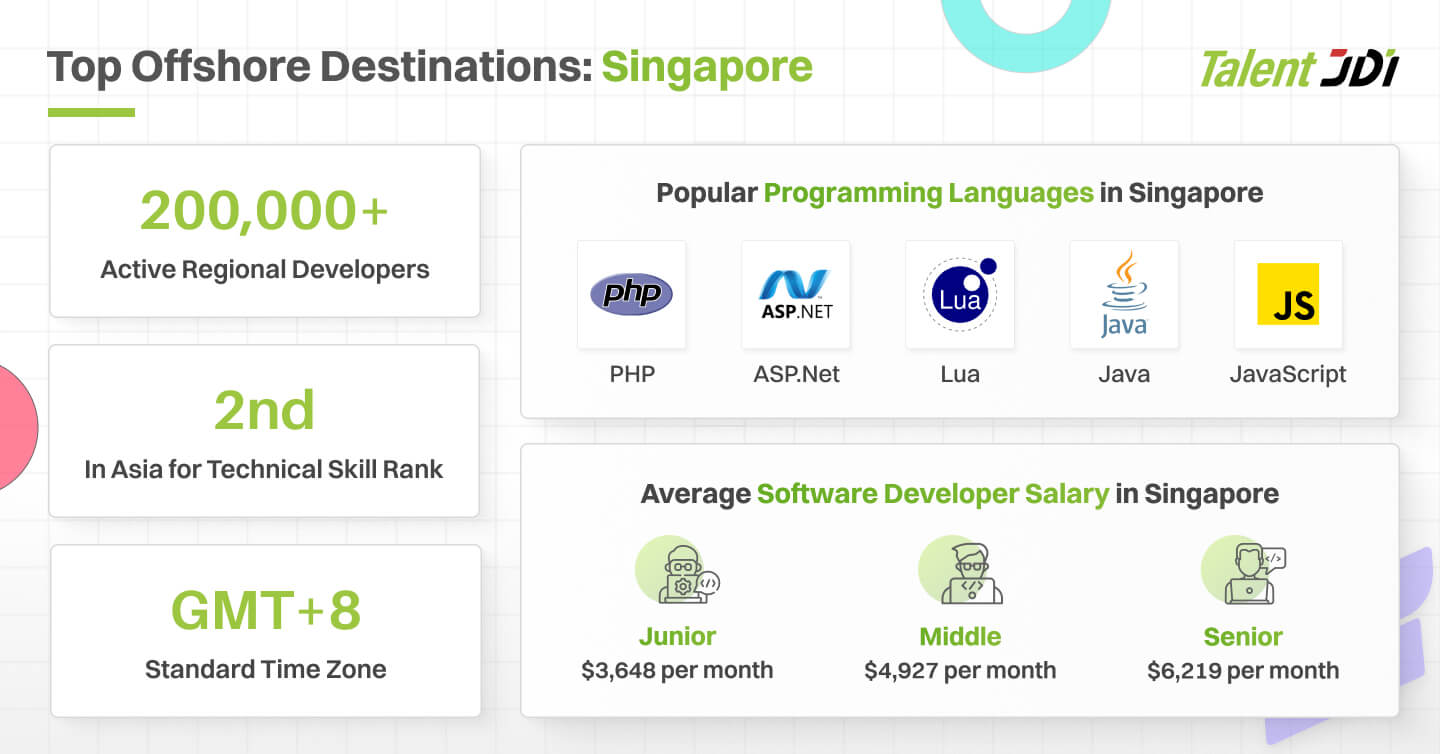
You might be surprised to see Singapore on this list—but don’t be. The country is home to some of the finest tech talent around. Add to that one of the most business-friendly environments in Asia (and the world), and it’s no wonder we’ve had clients from the US and Europe request to hire offshore developers in Singapore, often alongside setting up an office there.
Unlike markets competing on cost, Singapore’s strength lies in developer quality and a thriving business ecosystem. If the budget isn’t a concern, Singapore is a top-tier choice.
That said, the talent crunch is real. Securing elite developers here takes deep pockets and a well-planned strategy. For companies looking for a more budget-friendly yet high-quality alternative, nearby markets might just offer the perfect balance.
Why Hire Offshore Developers in Singapore? | Potential Downsides |
|
|
2. China
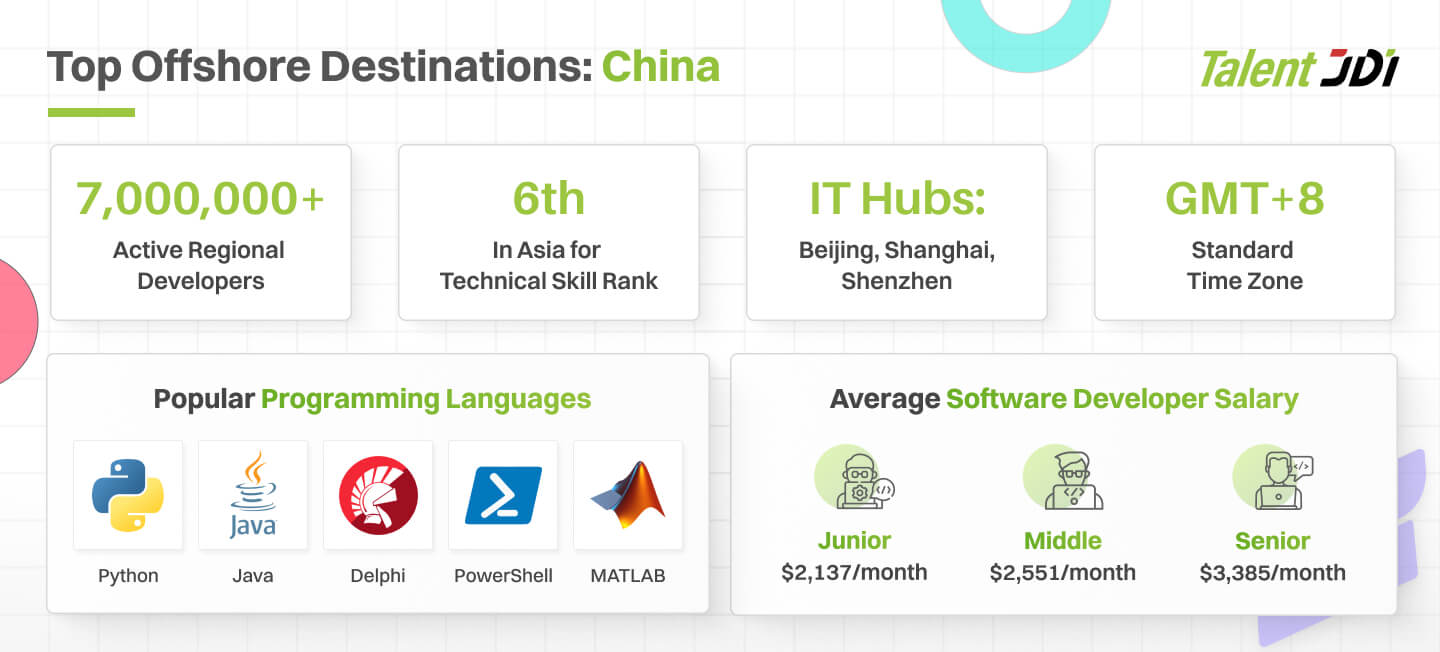
Before the offshore wave swept into ASEAN, China was the top pick for hiring remote developers. While rising labor costs, salary inflation, and geopolitical tensions—like trade policies and tariffs—have taken some shine off its appeal, China still boasts a massive pool of skilled tech talent.
It is also worth noting that IP protection continues to raise eyebrows. Businesses need to come armed with rock-solid contracts and tight compliance plans. On top of that, China’s complex regulatory environment can be a maze, particularly for foreign companies dealing with sensitive data.
Why Hire Offshore Developers in China? | Potential Downsides |
|
|
3. India
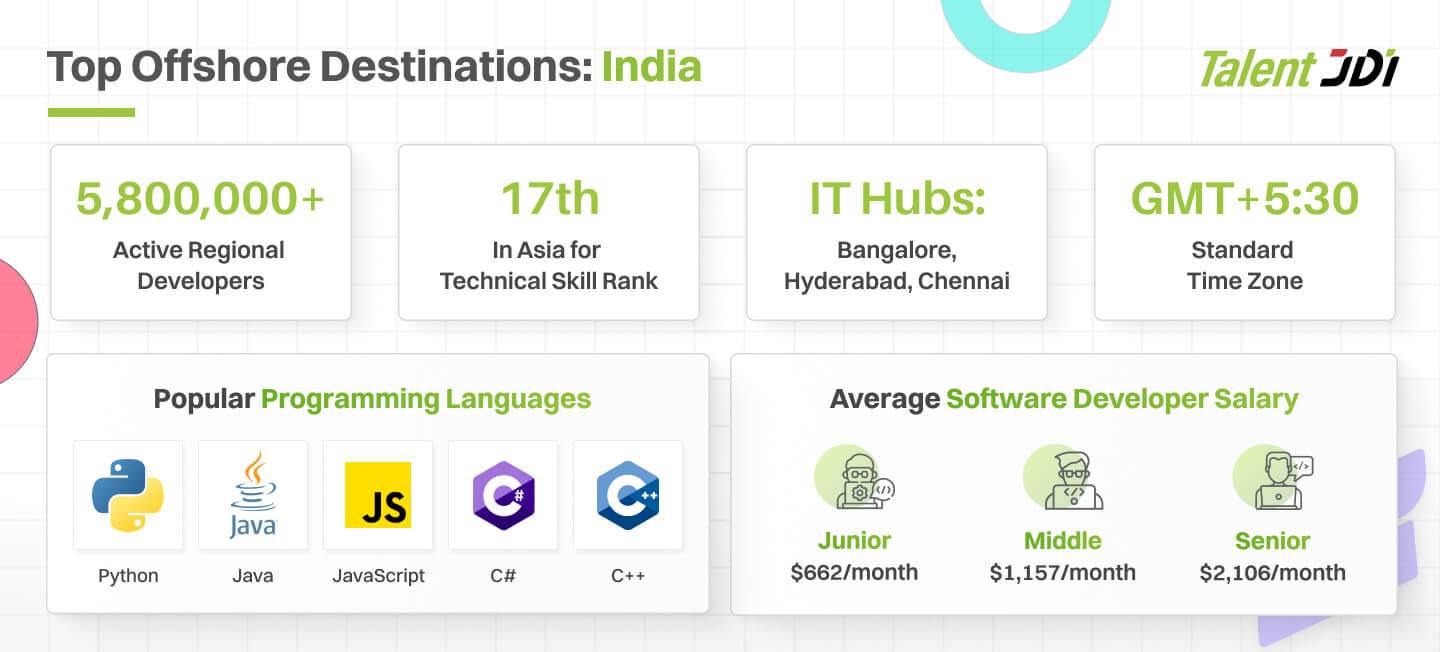
India has long been a great choice for hiring offshore developers and IT outsourcing, thanks to its vast tech talent pool. With competitive salary rates—averaging around $25,272 annually for senior roles—it remains a cost-effective option, second only to most ASEAN countries (excluding Singapore).
However, that strength is starting to show some cracks. Rising talent costs and growing concerns about quality have made the hiring landscape more challenging. Despite churning out a large number of tech graduates, around 63% of companies still struggle to find qualified talent in IT and engineering.
As a result, many businesses are now turning to ASEAN markets, where salaries are even more attractive, talent is equally skilled, and hiring tends to be faster, smoother, and more efficient.
Why Hire Offshore Developers in India? | Potential Downsides |
|
|
4. Vietnam
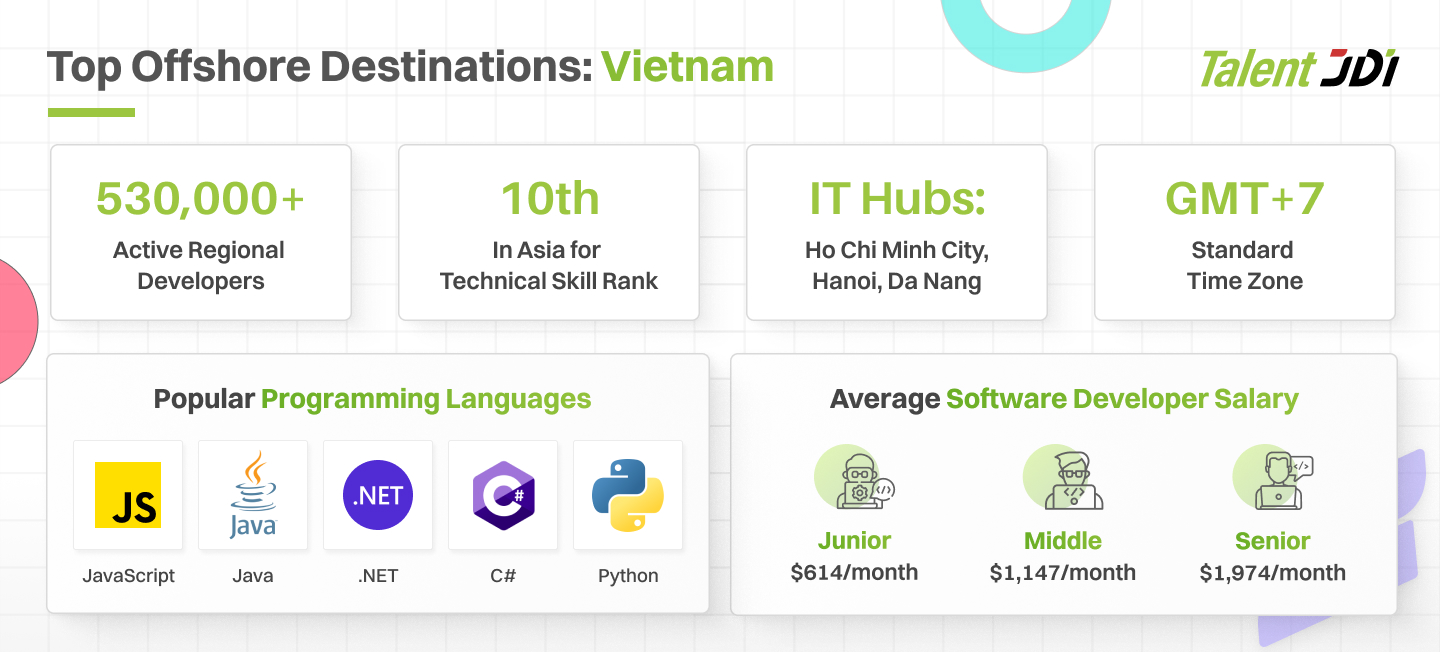
Vietnam may not rival China or India in developer headcount, but what it lacks in volume, it makes up for in quality.
Backed by over a decade of government investment in STEM and AI education, Vietnam now produces more than 80,000 IT graduates each year. The result? A skilled, tech-savvy workforce that’s quick to adapt to emerging technologies and deliver real project value.
And then there’s the cost advantage. With senior software developer salaries averaging around $1,974/month, and junior roles at just $614/month, businesses can cut hiring costs by up to 60% without compromising on quality.
English proficiency often comes up as a concern, but the reality on the ground tells a different story. Vietnamese developers consistently demonstrate strong communication skills and reliably deliver on client expectations.
Put it all together, and it’s no surprise that Vietnam has become a go-to hub for companies building offshore development teams and scaling tech operations efficiently.
Why Hire Offshore Developers in Vietnam? | What Should Be Addressed |
|
|
Interest in Vietnam’s talent market? Get more insights from our experts:

5. Malaysia
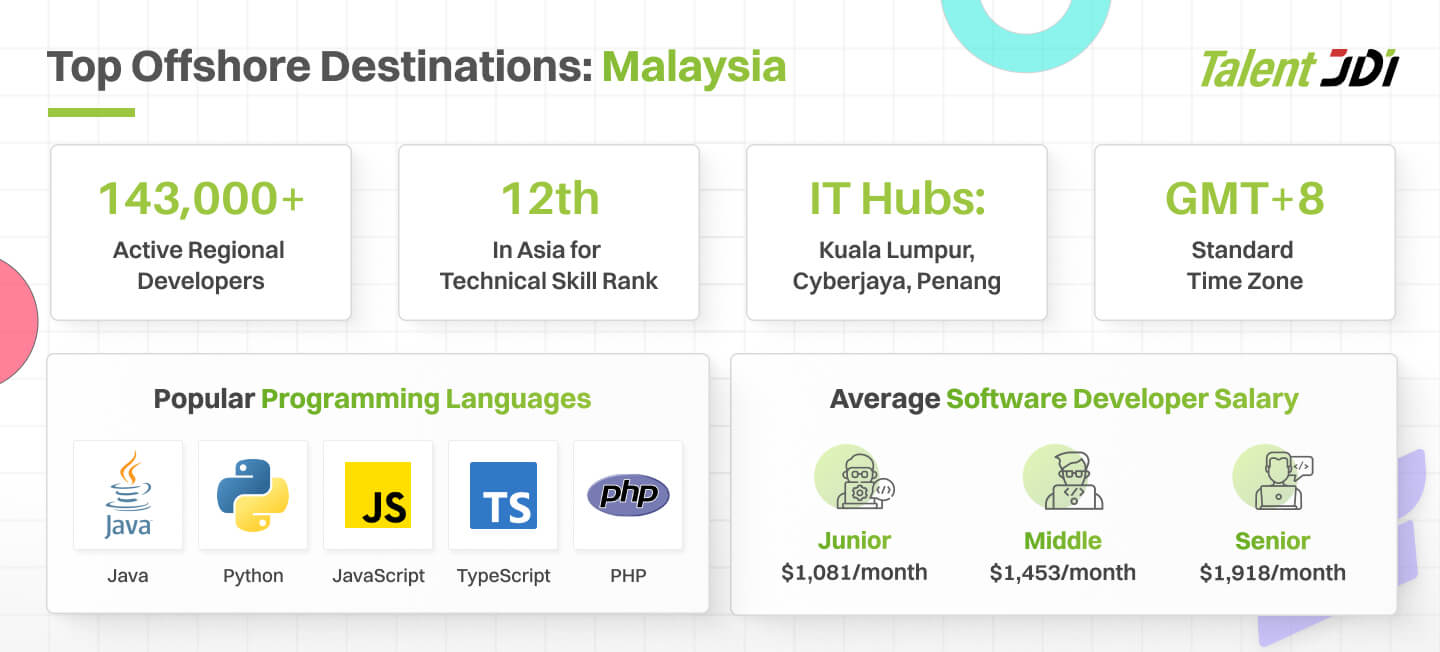
Malaysian developers typically have strong English proficiency, making cross-border collaboration and project alignment a breeze for international teams.
That said, there are a few considerations to keep in mind. Malaysia’s tech talent pool is significantly smaller compared to regional giants, which means competition for top-tier developers can be fierce, and salary expectations will be higher. Additionally, the country’s regulatory environment can be complex for foreign firms. From labor laws to tax structures and business permits, staying compliant requires careful attention and up-to-date local knowledge.
In short, Malaysia can be a great option for specialized roles or projects requiring high language fluency.
Why Hire Offshore Developers in Malaysia? | Potential Downsides |
|
|
For a quick comparison, here’s a snapshot of developer rates by experience level across key offshore destinations:
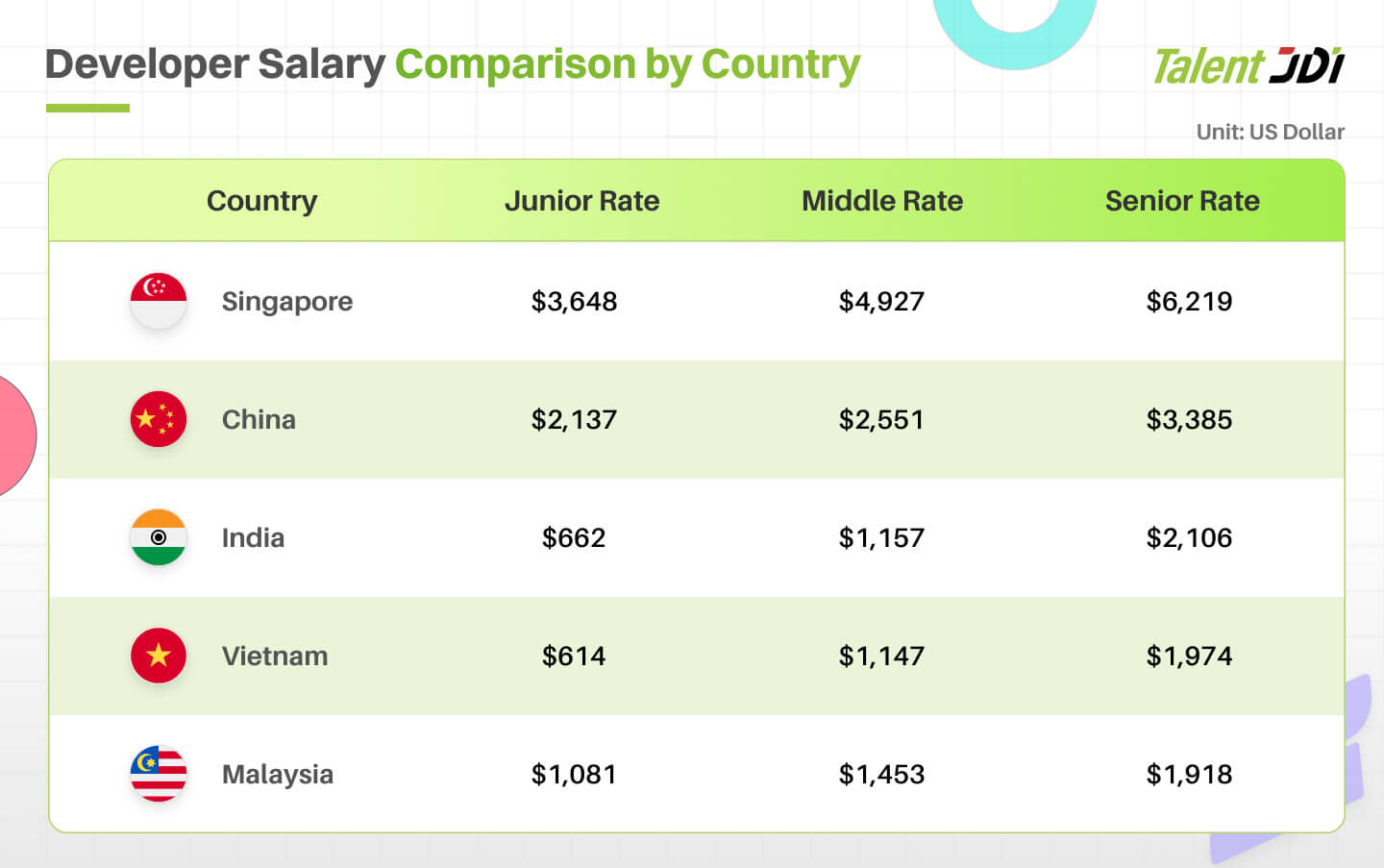
Need more detailed salary benchmarks? Check out: Software Developer Salary Comparison by Country
How to Choose an Ideal Destination to Hire Offshore Developers

1. Evaluate Skill Availability
The initial goal here is to choose a location that aligns with your project’s specific needs and technical requirements.
Consider these key questions for your research:
- Does the region possess expertise in the specific technologies/ industries essential for your project?
- Are developers in the area familiar with working on international teams and managing cross-cultural communication?
- How mature is the local tech ecosystem? Does it foster continuous learning, innovation, and collaboration?
2. Assess Hiring Cost
One common mistake firms make is only focusing on the salary rates, but not the total cost of ownership. Keep in mind that additional expenses such as training, retention, infrastructure, and the potential costs associated with turnover can quickly inflate your budget.
So, how can you address this?
Many businesses turn to trusted recruitment partners for guidance. Tapping into the expertise of those who truly understand the market gives them a clear picture of all the costs involved, helping them budget more accurately and make smarter hiring decisions.
3. Time Zone Differences
Time zone differences can either be an asset or a hindrance, depending on your working model. There are two main work models when dealing with remote teams across different time zones:
- Real-time Collaboration: If your development team needs to engage in frequent, synchronous communication and real-time debugging, this model is the best fit.
- “Follow-the-Sun” Model: Teams are distributed across different time zones so that when one team finishes its workday, another team picks up where it left off. This is particularly useful for continuous software development needs.
4. Research Legal and Regulatory Requirements
Examining a market isn’t just about talent, but also to ensure hiring is straightforward, tax obligations are predictable, and intellectual property is protected. Thus, extra efforts should be put into researching legal frameworks to avoid any compliance risks.
Here’s what to review:
- Employment Laws (e.g., contracts, termination policies, work permits, etc.)
- Taxation & Financial Regulations (e.g., corporate tax rates, VAT/GST obligations, etc.)
- Intellectual Property (IP) & Data Protection (e.g., IP laws, data privacy regulations, etc.)
Another recommendation is to work with a local Employer of Record (EOR). These experts handle compliance, payroll, and contract management, allowing you to focus on scaling your team without getting bogged down by legal complexities.
Interest in EOR? Learn more: What Is an Employer of Record? Weighing the Pros and Cons
5. Test The Water
If you are unsure about the new market dynamics, you can always start small to gauge the quality and efficiency of working with offshore talent. Hiring freelancers or scaling up with a small team of 2 to 3 developers to collaborate with your in-house staff is a practical approach to begin with.
That way, you can have the flexibility to expand your workforce or establish an Offshore Development Center (ODC) if the location proves to be a good fit. If the region doesn’t meet your expectations, you can pivot quickly without significant financial or operational risk.
Need more insights? Explore our past webinar to craft your next success story in building an offshore tech team:
Offshore Tech Hiring But Make It Fast & Effortless
Ready to lock in top IT talent, or does the whole process feel like a headache? Innovative companies like yours scale 2x faster and save over $200K a year by letting us handle the heavy lifting.
With access to a network of 16,000+ skilled tech candidates in Vietnam, Talent JDI helps businesses secure top developers in just weeks. We handle everything—from sourcing to seamless onboarding—so you can focus on scaling your business without the hiring hassle.
More than just a service, we’re a trusted partner. Over 300 businesses and enterprises worldwide have relied on us to tap into Vietnam’s thriving tech talent pool and drive innovation at scale.
Interested in hiring Vietnamese developers and building your own dedicated tech team? Reach out to us and share your requirements—we’ll make it happen!
